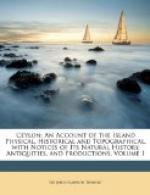[Footnote 2: [Greek: “metaxin.”] Of this foreign word, applied by the mediaeval Greeks to silk in general, as well as to raw silk, PROCOPIUS says:—[Greek: “Ahute de estin he metaxa, ex hes eiothasi ten estheta ergazesthai, hen palai men Hellenes mediken, tanun de seriken onomazousi."]—PROCOP. Persic. I. Metaxa, or anciently mataxa, “thread,” “yarn,” seems to be Latine rather than Greek. The metaxarius was a “yarn-broker;” and the word having got possession of the market, was extended to the woven stuff. The modern Greeks call silk [Greek: metaxa.]]
[Footnote 3: [Greek: “tzandana,”] probably “sandalwood;” sometimes called agallochum.]
[Footnote 4: [Greek: “ta exotera,”] those lying west of Cape Comorin.]
[Footnote 5: Malabar.]
[Footnote 6: Bombay.]
[Footnote 7: Scinde.]
[Footnote 8: [Greek: “androsthachon."]]
[Footnote 9: Southern Arabia, chiefly Hadramaut.]
“Sielediba, or Taprobane, lies seaward about five days’ sail from the mainland.[1] Then further on the continent is Marallo, which furnishes cochlea[2]; then comes Kaber, which exports ’alabandanum;’[3] and next is the clove country, then China, which exports silk; beyond which there is no other land, for the ocean encircles it on the east. Sielediba being thus placed in the middle as it were of India, and possessing the hyacinth, receives goods from all nations, and again distributes them, thus becoming a great emporium.”
[Footnote 1: Cosmas probably means “the more distant ports on” the mainland of India.]
[Footnote 2: [Greek: “kochlious,”] probably chankshells, turbinella rapa. See ABOUZEYD, vol. i. p. 6.]
[Footnote 3: [Greek: “alabandanon."]]
This description of the Indian trade by Cosmas is singularly corroborative of the account that had previously been given by the author of the Periplus; and as the Singhalese have at all times been remarkable for their aversion to the sea, the country-craft[1], thus mentioned by both authorities as engaged in voyages between Ceylon and the countries east and west of Cape Cornorin, must have been manned in part by Malabars, but chiefly by the Arabs and Persians, who, previous to the time of Cosmas, had been induced to settle in large numbers in Ceylon[2], attracted by the activity of its commerce, and the extensive employment for shipping afforded by its transit trade.
[Footnote 1: [Greek: “topika ploia."]—Periplus.]
[Footnote 2: REINAUD, Mem. sur l’Inde, p. 124. and Introd. ABOULFEDA.]
Amongst the objects, the introduction of which was eagerly encouraged in Ceylon, Cosmas particularises horses from Persia; the traders in which were exempted from the payment of customs. The most remarkable exports were elephants, which from their size and sagacity were found to be superior to those of India for purposes of war. Hence the renown accorded to Ceylon, as pre-eminently the birthplace of the Asiatic race of elephants.




